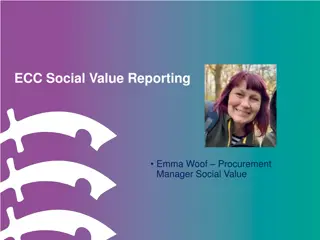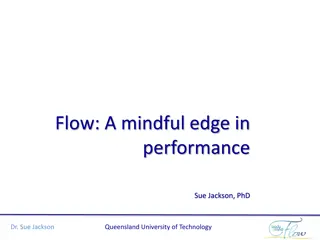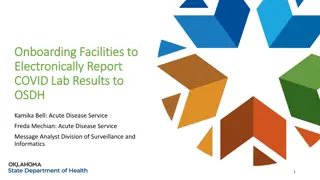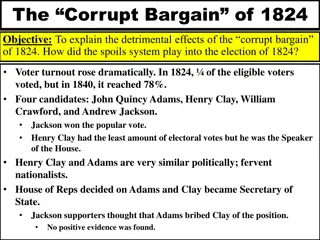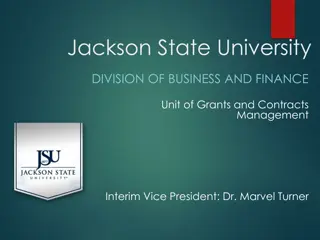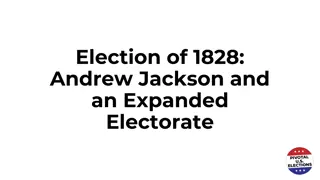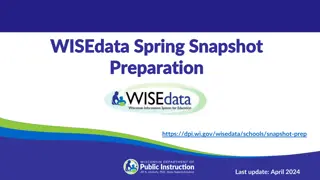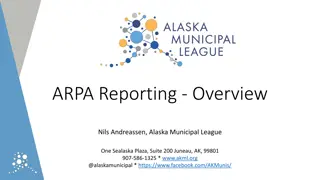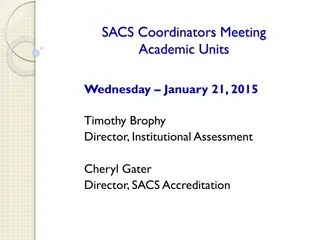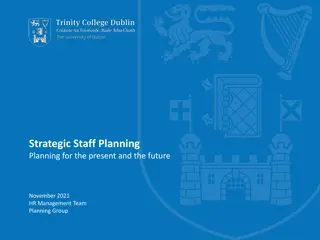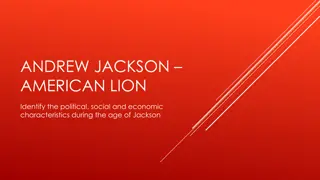Assessment Reporting and Planning at Jackson State University
Jackson State University focuses on producing diverse, ethical global leaders through student-centeredness, teamwork, and excellence. The institution aims to enhance academic and research prominence, athletic prowess, campus aesthetics, and sustainability while embodying Tiger pride and community engagement to achieve its presidential goals.
Download Presentation

Please find below an Image/Link to download the presentation.
The content on the website is provided AS IS for your information and personal use only. It may not be sold, licensed, or shared on other websites without obtaining consent from the author.If you encounter any issues during the download, it is possible that the publisher has removed the file from their server.
You are allowed to download the files provided on this website for personal or commercial use, subject to the condition that they are used lawfully. All files are the property of their respective owners.
The content on the website is provided AS IS for your information and personal use only. It may not be sold, licensed, or shared on other websites without obtaining consent from the author.
E N D
Presentation Transcript
By: Ms. Arnitra Hunter Research Associate Institutional Research Planning and Assessment
To understand Assessment Reporting. To re-visit assessment templates to ensure understanding and completion of all necessary components. To understand the how to when submitting the completed assessment report. To visit SACSCOC expectations and standard documentation criteria (2018 SACSCOC Principles of Accreditation Manual (7.1 Institutional Planning; 8.1 Student Achievement; and 8.2a Student outcomes: educational programs)
Assessment Planning/Reporting Cycle Assessment Template Work Session Question and Answer Session
MISSION The University produces technologically-advanced, diverse, ethical, global leaders who think critically, address societal problems and compete effectively. VISION Building on its historic mission of empowering diverse students to become leaders, Jackson State University will become recognized as a challenging, yet nurturing, state-of-the-art technologically-infused intellectual community. Students and faculty will engage in creative research, participate in interdisciplinary and multi-institutional/ organizational collaborative learning teams and serve the global community.
THREE PILLARS OF UNIVESITY SUCCESS STUDENT CENTEREDNESS TEAMWORK & COLLEGIALITY THE PURSUIT OF EXCELLENCE/RAISING THE BAR
PRESIDENTIAL GOALS STUDENTS FIRST & FOREMOST- Become one of the most student-centered universities in the country by implementing relevant and appropriate Student Success strategies, developing students holistically and ensuring student Return on Investment ACADEMIC & RESEARCH PROMINENCE Become one of the most respected and prominent research universities in the country by maintaining our higher research status, becoming a Top U.S. News & World Report ranked HBCU, having the best and most extensive HBCU Online degree program offerings and fulfilling our designation as Mississippi s Public Urban Research University ATHELETIC PROWESS RETURN OF THE GLORY DAYS OF JSU SPORTS Become one of the premier NCAA FCS sports programs in the country, where student-athletes compete fearlessly on and off the field, are retained and graduate, have access to quality coaching, mentorship and facilities and are actively engaged in campus life beyond athletics. CAMPUS AESTHETICS & SUSTAINABILITY - Retain and grow our status as one of the most beautiful and attractive urban campuses in the country by continuously investing in our physical plant and grounds, repairing and renovating older facilities and building new structures in order to compete favorably for students, faculty and staff. CHANGING THE CULTURE, DEFINING TIGER PRIDE & EMBRACING OUR STATUS AS A COMMUNITY PILLAR Become nationally known for quality customer service; efficient and effective operations; nurturing; caring and competent, faculty and staff; alumni who readily give of their time, talent and treasure, and fulfilling our call to be a great community, city and state resource and partner
GoalTo maintain a culture of assessment at Jackson State University in both academic and non-academic (educational and administrative support units) areas whereby improvements in organizational efficiency is observed for administration, faculty, staff, students, and other stakeholders.
STUDENT LEARNING Goal Attainment Decision Making Accountability University Accreditation SACSCOC 8.1 (Student Achievement) and 8.2.a (Student Outcomes: Educational Programs) (2018 SACSCOC Principles of Accreditation Manual) Improvement in Service to Students
Goals/ Objectives Use of Results Means of Assessment Assessment Results Criteria for Success
Summary of Assessment Major Difficulties Summary Conclusions New Year Goals and Objectives Date Approved By Completed
University INVOLVE YOUR DEPARTMENT SUCCESS ASSESSMENT YOU ARE THE VIP OF YOUR DEPARTMENT STUDENT LEARNING
Assessment Planning/Reporting Demographics Fiscal Year Division Departmental Name Departmental Mission
Describes the services of the College/Division Describes the services of the Unit/Department Describes the existence of your academic program
Student learning outcomes (SLOs) for each academic degree program are what you want students to know and be able to demonstrate when they have completed the prescribed curriculum. There should be at minimum 3 to 5 student learning outcomes for each academic degree program. SLOs should be measurable and reflect outcomes of the prescribed curriculum. SLO s should be written in future verb tense.
Assessment Measures How will the success of the student learning outcome be measured? What are the measures? Multiple Measures Minimum of two (2) per student learning outcome Usage of the same measure to evaluate more than one student learning outcome is acceptable. Usage of Direct Measures (portfolios, papers, projects, internships, performances, standardized tests) Usage of Indirect Measures (surveys, focus groups, interviews, etc.)
Success Criteria Quantify the standards of success for your means of measurement Anticipate desired results (realistic) while holding students to rigorous academic standards What is your BASELINE DATA?
Collect your data from the means of assessment. Document your results. Document the results (met, fail to meet, or exceeded the criterion for success) Highlight key results and special findings Use past verb tense Relate results to the student learning outcome Describe the process used to analyze and summarize results
Data results should indicate areas of strengths and weaknesses; additions and modifications; and revisions needed in the assessment cycle. If data results indicate that the criteria for success has been met, criterion for success may be increased to show progression in academic achievement of students. If data results indicate that the criteria for success has NOT been met, review of the criterion for success, with specific improvements to academic pedagogy and student achievement, is necessary.
Major Difficulties Major Difficulties: Road Blocks Different components that may have kept your area from accomplishing your goal.
Summary Conclusion This section should conclude how the Three Pillars of University Success as it relate to your department. Student centeredness Teamwork and Collegiality The Pursuit of Excellence/Raising the Bar
NEXT YEARS STUDENT LEARNING OUTCOMES/GOALS
Assessment Plans FY2020 November 1, 2019 (Upload- via website) Assessment Plan Feedback, January 2020 Assessment Reports FY 2020 May, 2020 (Upload-via website) Assessment Report Feedback -July, 2020
Contact Information Ms. Arnitra Hunter Research Associate arnitra.r.hunter@jsums.edu (601)-979-0203


